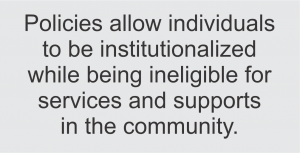Institutional Bias
 The Social Security Act created the Medicaid program, which is one of the only programs, private or public, that pays for Long Term Services and Supports (LTSS). LTSS are called Home and Community-Based Services (HCBS ) when you get them in your community. Getting LTSS in the community is not an entitlement and there are long waiting lists, but getting services are a guaranteed entitlement in institutional settings.
The Social Security Act created the Medicaid program, which is one of the only programs, private or public, that pays for Long Term Services and Supports (LTSS). LTSS are called Home and Community-Based Services (HCBS ) when you get them in your community. Getting LTSS in the community is not an entitlement and there are long waiting lists, but getting services are a guaranteed entitlement in institutional settings.
Federal Medicaid law requires states to cover nursing facilities and other institutional care but does not require states to cover the full range of HCBS to meet the needs of people with disabilities, including older adults, in the community. Medicare’s coverage of long-term services and supports is limited in ways that reinforce a bias towards institutional care.
Despite federal law and Supreme Court rulings, many people with disabilities are denied their right to choose to live independently in the community. Instead, they are more likely—and often structurally compelled—to live in long-term, congregate care settings, including nursing homes (where many younger people with disabilities reside alongside older adults with functional limitations), psychiatric institutions, residential group homes, and private institutions. The reasons for this outcome are systemic, including inadequate federal and state funding for home- and community-based services; a lack of accessible, affordable housing stock; the privatization of congregate care living options; and with Medicaid—the major financer of long-term supports and services—a bias toward institution-based care (McDonald et al. 2020)
Congregate care settings have long been associated with poorer outcomes, from decreased access to care to lack of control and self-determination to abuse and neglect (McDonald et al. 2020).
